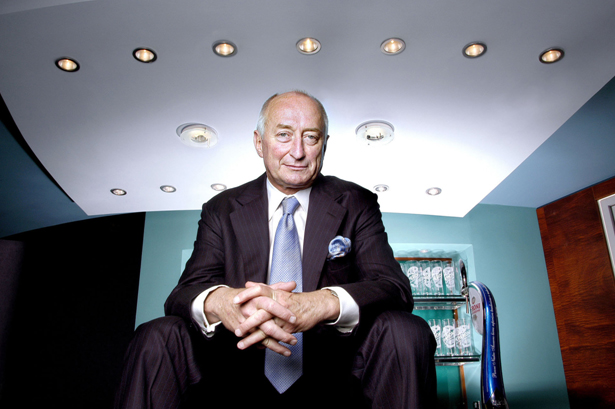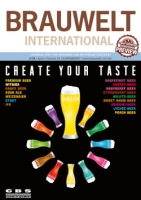Obituary – Graham Mackay, Chairman of SABMiller, died 18 December 2013, aged 64
Appearances can be deceiving – never more so than in the case of Graham Mackay. Had there been a competition “Best Dressed Brewer” he would have easily won it year after year. Not for him the dressed down look of an open collared button-down shirt with flashing white undershirt, espoused by some of his competitors. No, Mr Mackay was an ultra-sharp dresser, always wearing shiny silk ties with handkerchiefs just popping out of his breast pocket and pin-striped suits, whose stripes were often so thick and broad he could have been mistaken for a Cockney wide boy made good.
Strangely, he also seemed to have a penchant for those garish red braces popularised by the 1987 film “Wall Street”, which starred Michael Douglas as the flamboyant but ruthless trader Gordon Gekko. If memory serves me right, some years back SABMiller even had a photo of Mr Mackay in Gordon Gekko pose on its corporate website, wearing shirtsleeves and red braces. Apparently, someone eventually persuaded Mr Mackay that following the financial crisis of 2008 such a photo might give shareholders wrong ideas about the company and it was taken off the web.
Over the years I have been an avid follower of Mr Mackey’s public persona. I know that secretly he would have chuckled at what observers, like me, read into his looks: did he want to be taken for a London banker or for a Wall Street tycoon? In fact, he was neither. He was one of the most down-to-earth executives in the brewing industry, with a really wicked sense of humour, probably getting endless mileage out of winding people up, especially if they happened to be his competitors.
Unlike the money types, Mr Mackay did not believe in corporate mumbo-jumbo. He did not mince words nor did he eat crow. Mr Mackay was notorious for his bullish nonchalance in defying business etiquette by publically commenting on his competitors while spelling out uncomfortable truths in an almost offensive matter-of-fact way.
Being in the presence of Mr Mackay could be intimidating: the shaven head, the hawk nose and those hooded eyes with one slightly raised eyebrow which gave him an air of an overbearing schoolmaster exuding paternalist concern for the dumb, dimwitted or otherwise intellectually challenged.
It must have been in the early Noughties at a brewers’ convention in South Africa, when the severity of the HIV/AIDS pandemic in Africa was finally being acknowledged in the rest of the world, that I approached Mr Mackay and asked him whether he would mind being interviewed by me on the spot. He did not, although it would not have been standard procedure to face a journalist without PR staff hovering over us.
As we settled into our chairs facing each other, I fired my first question at him. “Mr Mackay, what are you at SAB going to do about HIV/AIDS?” If he had been caught out by my question, he did not show. But rather than fobbing me off with some effusive corporate waffle, he merely leant back, raised his eyebrow and retorted: “Why should I be doing something about it?” I explained to him that he could do it for two reasons: one being economic (at the time 19 percent of South Africa’s adult population suffered from HIV/AIDS and businesses feared losing staff to the illness because the Mbeki government did not provide them with treatment) the other moral.
However, no matter how hard I pressed on, even reminding him of Jürgen Schrempp, the CEO of the German carmaker Mercedes-Benz, who had made it his personal priority to implement an HIV/AIDS strategy at their plant in South Africa in defiance of the government’s official stance, Mr Mackay refused to be cajoled into an answer, let alone some sort of commitment. Most likely, he sighed to himself that yet again he had to face one of those European do-gooders who had come to Africa with a moral chip on her shoulder the size of the Kilimanjaro, while knowing precious little about African realities and SAB’s precarious position viv à vis the country’s ANC government.
Although I feared that eventually Mr Mackay would send me flying out as we both stood our grounds, we managed to bring the interview to a civil closure. I never learnt what Mr Mackay thought was SAB’s corporate duty with regard to the HIV/AIDS pandemic. But I noticed that soon afterwards a department at SAB was set up to deal with the issue, thus shaming South Africa’s government into changing its AIDS policy. It now offers the 6 million South Africans with HIV free antiretroviral drugs if their immune strength drops below a critical level.
I am quite convinced that Mr Mackay personally adhered to the Milton Friedman school of thought that the social responsibility of business is to run successful companies, contributing to tax revenues and investing in local economies. He did not believe that companies had a duty to do the work of elected governments. Being a hard-nosed South African, he probably thought the whole corporate responsibility agenda a whole lot of hogwash. But he was also a pragmatist, relentlessly working to keep SAB and later SABMiller on good terms with shareholders and investors. That’s why he sent SABMiller down the CSR path when pressure piled up on stock-market listed companies to engage in sustainability programmes. Or when there were calls for more women on corporate boards, SABMiller was among the first to make several high-profile appointments.
Naturally, Mr Mackay had a big ego, yet he was no megalomaniac. Hubris, greed and braggadocio weren’t among his character traits. In actual fact, if anybody in the brewing industry excelled in the art of deal-making it was him. Rather than let the acquired walk away with a pot of his gold, he persuaded them to take a stake in SAB instead, most famously when he acquired Miller Brewing in the U.S. in 2002, which led to the subsequent re-naming of the business as SABMiller, and when he took over Bavaria in Latin America in 2005. Other transactions may not have made huge waves like the share-swaps with France’s Castel in 2001 and Turkey’s Efes in 2011, or the joint venture between SABMiller and Molson Coors in the USA in 2008. However, they all, in one way or another, helped eliminate the threat of potentially acrimonious competition and fend off unwanted attention from prying rivals.
Considering the, ahem, complex composition of SABMiller’s board, Mr Mackay cannot have been a sun king who surrounded himself with yes-men and crushed dissent. He was a leader and an integrator. Take it as a proof of his brilliance that unlike other CEOs these days, who last half as long in the job, on average, as they did a decade ago, Mr Mackay enjoyed the longest tenure among his brewing industry peers. For 16 years he was at the top of SABMiller, having been appointed Group Managing Director of SAB in 1997 and CEO in 1999. Cruelly, when he became non-executive Chairman in April 2013, he was diagnosed with a brain tumor. After a brave battle against the disease he passed away on 18 December 2013 in Hampshire.
It may be a cliché to say when someone dies that they will be sorely missed, or that they will leave a gap that is hard to fill, but in the case of Mr Mackay all the clichés are true.
Authors
Ina Verstl
Source
BRAUWELT International 2014


